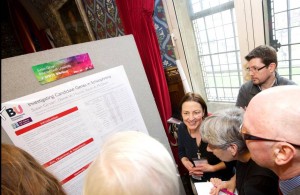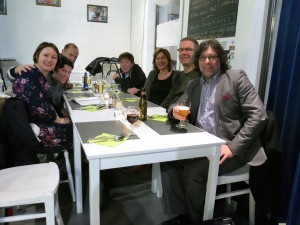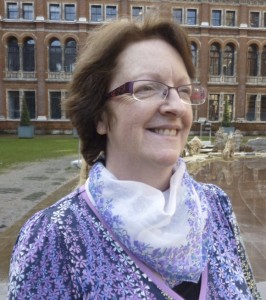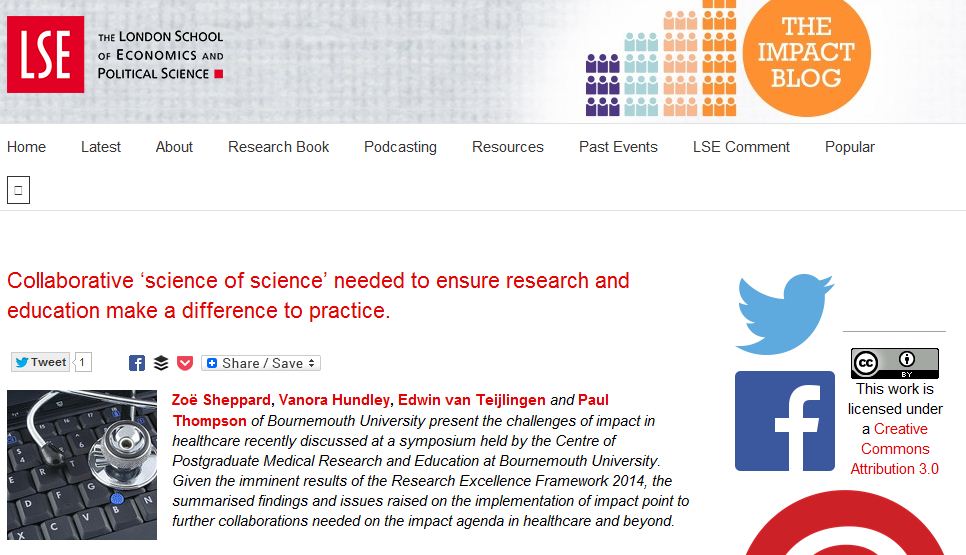BU was well represented at BCUR’s Posters in Parliament Event in February. Karolina Tamauskaite of the Faculty of Management and Susan Girvan of the Faculty of Science and Technology presented their undergraduate research.
Sponsored by the University of Central Lancashire (UCLan), the Higher Education Funding Council for England (HEFCE) and the Higher Education Academy (HEA), undergraduate students from 24 universities visited Westminster to unveil research findings from a wide range of fascinating subject areas. Among them uni’s included: London School of Economics, London Metropolitan University, Universities of: Aberdeen, Nottingham, Leeds, Reading, Sussex and Exeter. Research topics ranged from cyber-bullying, medicinal properties in wheatgrass juice, climate models, and deprivation in mixed communities, etc.
Susan Girvan is studying a BSc (Hons) in Biological Sciences said “… it was great to meet other undergraduate students from from universities across the country about their research and to see such a wide range of subject matter being represented. Everyone at the event was really approachable and friendly and feedback on my own research was always encouragingly positive”. Susan’s dissertation supervisor Kevin McGhee, Senior Lecturer in Health Sciences was also on hand. Kevin notes that Susan was quizzed by 3 of the Posters in Parliament eminent judges, chaired by Sir Anthony Cleaver, on her research that is funded in part by the BU alumni fund, working with NUI Galway and within a larger international Fusion Project. Her poster on one specific gene, showed the methods employed by geneticists to identify how genes work together to make someone susceptible to schizophrenia.
Presenting these results at Parliament definitely has an impact nationally, as many MPs also attended the event.
For final year International Hospitality Management student Karolina Tarnauskaite from the Faculty of Management, “Posters in Parliament was a perfect external platform and opportunity for me to present my research, to the public. It was a great and very successful event as I had an opportunity not only to present the hospitality sector issues that I have interest in, but I had an opportunity to have an informed discussion with people from a variety of different backgrounds and disciplines”.

Karolina Tarnauskaite from the Faculty of Management presents her research on the adoption of tapas concept in other cuisines in the hospitality sector
The judging panel was led by UCLan Honorary Fellow Sir Anthony Cleaver, Chairman of the Natural Environment Research Council, and Professor Mick Healey, a leading expert of undergraduate research, and Professor Philippa Levy, Deputy CEO of the Higher Education Academy.
Deputy Vice Chancellor, Tim McIntyre-Bhatty was equally pleased to have BU’s presence in Parliament “It’s great for the students and staff involved, and for BU. Excellent to see all involved in such a high profile event and in good company”.
The event gives BU and other UK universities a stage to present high quality work being produced by undergraduates and also demonstrated how research-informed teaching can enhance the overall student experience. It also is a platform to promote student and staff collaboration on research outputs and publications, with links to BU Fusion.
BU’s presence is precursor to its involvement in the national BCUR (British Conference in Undergraduate Research) taking place at the University of Winchester in April, but also for BU’s inaugural SURE (Showcasing Undergraduate Research) conference being held on March 4th. SURE is the product of a successful fusion bid and first showcase of its kind at BU where undergrad research and coursework is profiled and promoted to internal and external audiences.
BCUR has made a significant contribution to the success of undergraduate research and continues its work to promote it in all disciplines by providing students with an opportunity to share their research through poster presentations, spoken papers, or through creative outputs such as performances and film.
UCLan’s Professor Stuart Hampton-Reeves, Chair of the BCUR Steering Group, said: “This is our third Posters in Parliament and the event is clearly going from strength to strength demonstrating the vitality and quality of undergraduate research. MPs and other policy-makers have today had the opportunity to see the next generation of academics performing at a level that is already of an international standard.
“It shows that UK higher education is in good health. We need to continue to protect and nurture our undergraduate research base. By providing more opportunities for our young researchers to develop through inquiry, we can help them grow as academics to confront some challenging topics. The range of issues discussed here today shows that this generation of students is already making a real and valuable contribution to understanding the world around us.”





















 Dr. Ashraf cited on ‘Modest Fashion’ in The Guardian
Dr. Ashraf cited on ‘Modest Fashion’ in The Guardian NIHR-funded research launches website
NIHR-funded research launches website Academics write for newspaper in Nepal
Academics write for newspaper in Nepal New paper published on disability in women & girls
New paper published on disability in women & girls Global Consortium for Public Health Research 2025
Global Consortium for Public Health Research 2025 MSCA Postdoctoral Fellowships 2025 Call
MSCA Postdoctoral Fellowships 2025 Call ERC Advanced Grant 2025 Webinar
ERC Advanced Grant 2025 Webinar Horizon Europe Work Programme 2025 Published
Horizon Europe Work Programme 2025 Published Horizon Europe 2025 Work Programme pre-Published
Horizon Europe 2025 Work Programme pre-Published Update on UKRO services
Update on UKRO services European research project exploring use of ‘virtual twins’ to better manage metabolic associated fatty liver disease
European research project exploring use of ‘virtual twins’ to better manage metabolic associated fatty liver disease